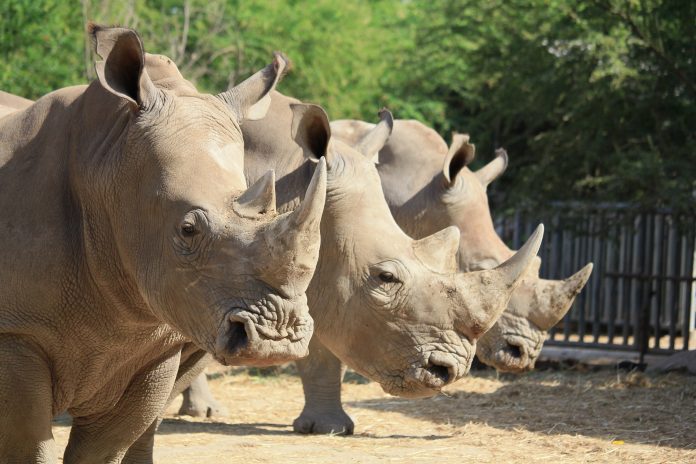The Hawks in Mpumalanga have applauded the conviction of a woman linked to money laundering through illegal trading in rhino horns.
Ping Wu, 49, was on Wednesday condemned to five years in jail by the Tembisa regional court, a sentence that saw Major-General Zodwa Mokoena, provincial head of the Hawks in Mpumalanga, clapping for the investigating team and the judiciary.
Captain Dineo Lucy Sekgotodi, spokesperson for the directorate for priority crime investigation (Hawks), said in April 2019 the Hawks’ serious organised crime investigation team in Middelburg launched an undercover probe into the allegations of illegal rhino horn trade. The investigation aimed to uncover a crime syndicate in Gauteng that illegally dealt in rhino horns.
“On July 23 2019, a search and seizure operation was conducted at Emperors Palace in Kempton Park. Ping Wu facilitated various money-laundering transactions. These included carrying large sums of banknotes into the casino after a rhino horn deal was done,” said Sekgotodi.
She explained further: “She was arrested and detained in custody since August 15 2019 after her bail bid was successfully opposed.”
Last month Barbara Creecy, the Minister of Forestry, Fisheries, and Environment, reiterated her department’s commitment to stamp out rhino poaching. She approved the quotas for the trophy hunting of black rhinos, leopards, and elephants in South Africa for 2022.
The department’s spokesperson, Albi Modise, explained that the quota for leopards has been set at 10 and was informed by robust data generated through a sophisticated national leopard monitoring programme.
In a statement that followed, Modise said: “Leopard hunts will only be allowed in areas where leopard populations are stable or increasing, and only male leopards seven years of age or older may be hunted. Implementing a strict seven-year age minimum for trophy leopards dramatically reduces the risk of overharvesting.
“A total of 10 black rhino may be hunted, and 150 elephants. Only adult male black rhinos will be hunted, and only on conservation management grounds. This is in accordance with a set of strict criteria to ensure that demographic and/or genetic conservation is enhanced [as stipulated in the black rhinoceros biodiversity management plan].”
Modise said the black rhino quota is based on the national population estimates per subspecies, all three of which show an increasing trend at present, adding that only a very small portion of the overall elephant population is hunted annually (less than 80 elephant bulls, which is less than 0.3% of the total population).
Modise also shared that the national elephant herd shows an increasing trend and the quota of 150 is well within sustainable limits.
Dave Bryant, the DA spokesperson on environment, forestry, and fisheries, said the opposition party condemned the recent approval of hunting permits for endangered rhino and elusive leopards.
“South Africa’s wild rhino population has already declined by 75% over the past 10 years due to poaching and this decline is expected to continue in years to come,” said Bryant.
“It is unfathomable that government sees fit to allow wild black rhinos to be shot by trophy hunters while our brave SANParks rangers are risking their lives every day to save these critically endangered animals from poachers.
“There is also no indication as to how these hunts will provide economic benefit to local communities. It is further concerning to note the permission given to hunt leopards.
Bryant explained further: “In response to a parliamentary question, last year minister Creecy advised that there could be as few as 2 185 leopards remaining in the country and that the available estimates of the population vary greatly.
“Due to their elusive nature, leopards are often hunted at night. While the department claims they will only allow old leopards to be hunted, it remains unclear as to how they will ensure this, especially during night hunts.”
Bryant added that the approval of trophy-hunting permits is a “misguided decision” that the DA will not condone.
“The DA recognises that hunting plays an important role in South African tourism and provides much-needed jobs, but we cannot condone the hunting of our critically endangered black rhinos and elusive leopards.”
Despite the outcry, Modise said: “The hunting sector conservatively contributed R1.4-billion to the economy in 2019, excluding the economic contribution to tourism and all hunting and safari-related industries.
“The income generated by the species’ fees totalled approximately R1.1-billion of which about R208-million were derived from the trophy hunting of threatened or endangered species,” said Modise.
He also noted that these species are central to “a vibrant hunting industry”.
“Hunting is a part of the South African heritage and culture. This is a sector that generates economic benefits as part of the South African rural economy.”
Also read: Rhino breeder loses millions
Government condemns rhino poaching
Follow @SundayWorldZA on Twitter and @sundayworldza on Instagram, or like our Facebook Page, Sunday World, by clicking here for the latest breaking news in South Africa. To Subscribe to Sunday World, click here.



